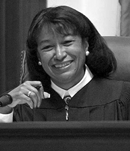Democrats offer to allow some Bush nominees their vote, but GOP insists on up or down on all
Even as Senate Majority Leader Bill Frist addressed a television audience that organizers of “Justice Sunday” claimed was 61 million in the Christian right’s effort to mobilize support to end Democratic filibusters on the Pres. George W. Bush’s judicial nominees, a smaller gathering in Darien, Connecticut, included one of the key figures who has sparked the high-profile showdown between Capitol Hill Democrats and Republicans.
According to the Stamford Advocate, Janice Rogers Brown said, speaking to a group of Roman Catholic legal professionals following the Red Mass traditionally held on the Sunday before May 1, which is Law Day, “These are perilous times for people of faith. Not in the sense that we are going to lose our lives, but in the sense that it will cost you something if you are a person of faith who stands up for what you believe in and say those things out loud.”
The current controversy began when Bush re-nominated ten judges to the federal bench whom the Democrats rejected during his first term because they said they were too radically conservative. Brown was among those ten justices block and now re-nominated. The other 210 federal judicial appointments made by Bush in his first term were confirmed by the Senate.
The first time Brown was up for confirmation before the Senate, Democrats used the filibuster, essentially a tool for open-ended debate, to prevent a vote from ever being taken. They have vowed to do the same this time in the case of Brown and the other nine nominees under consideration.
A filibuster can only be stopped with 60 votes. There are not enough Republicans in the Senate to reach this number, and GOP leaders want to change the rules for judicial nominees so that a simple majority can halt the filibuster. Calling this a threat to democracy, Democrats have vowed that if this is done, they will shut down all Senate business.
Brown, a California Supreme Court justice, has never been a darling of the left. Among other things, her opponents have cited her opposition to affirmative action, as well as a 2000 speech in which she said, “where government moves in, community retreats, civil society disintegrates and our ability to control our own destiny atrophies… The result is a debased, debauched culture which finds moral depravity entertaining and virtue contemptible,” as evidence she is outside the political mainstream.
“The filibuster involves ten people who have indicated that they can’t disconnect their religious beliefs from constitutional principles,” said Rev. Barry Lynn, executive director of Americans United for the Separation of Church and State.
“The other 205 judges the Senate approved were people of faith who said they could do this. Justice Brown has indicated she can’t,” he said.
Objections to the other Bush nominations have attracted similar complaints.
Lambda Legal this week raised serious concerns about William Pryor, Jr. a judge nominated for the 11th Circuit Court of Appeals. Like Brown, Pryor was nominated during Bush’s first term and blocked by Democrats, although he did serve for a time on the 11th Circuit when the president exercised his prerogative to make a temporary appointment during a congressional recess.
“Many nominees don’t have a clear record on LGBT issues, but Pryor has one that goes back through some of the most important cases in recent years,” said Kevin Cathcart, Lambda Legal’s executive director, explaining why Lambda had taken the unusual step of opposing judges nominated for a federal appeals court. “He has shown a complete disdain for the rights of gay people.”
As Alabama’s attorney general, Pryor defended Texas’s anti-gay sodomy law in a friend-of-the-court brief he wrote for the Lawrence v Texas case before the U.S. Supreme Court. His brief compared the rights of gay people with “prostitution, adultery, necrophilia, bestiality, possession of child pornography, and incest and pedophilia.”
A vote by Pryor during his temporary stay on the federal appeals court particularly disturbed Lambda. When a three-judge panel of the 11th Circuit upheld Florida’s ban on adoption in a two to one decision, Pryor cast the tie-breaking vote in rejecting Lambda’s motion to have the full circuit panel hear the case. Instead, the matter went onto the Supreme Court, which declined to hear the case, thus letting the gay adoption ban stand.
“Several judges on the appeals court wanted to hear the case and said the law raised ‘serious and substantial questions’, but William Pryor kept that from happening,” Cathcart said, in a written statement. “As a result, lesbians and gay men in Florida can not adopt children who need permanent, loving homes.”
For several days, there were signs of a potential compromise by Senate leaders on the filibuster question. On the same Sunday Frist called for an end to the filibuster option, Joseph Biden, a Delaware Democrat who sits on the judiciary committee, said on ABC News’s “This Week”: “I think we should compromise and say to them that we’re willing to, of the seven judges, we’ll let a number of them go through, the two most extreme not go through, and put off this vote.”
But then the White House weighed in. Vice Pres. Dick Cheney said he would be willing to cast a tie-breaking vote in his position as Senate president if there came a vote to change the rule regarding judicial filibusters.
On Tuesday, Karl Rove, deputy White House chief of staff, told USA Today that any compromise would be rejected. Frist, soon afterwards, followed Rove’s lead and said there would be no compromise on the filibuster issue as long as Democrats insisted on blocking a vote on any of the nominees.
The Democratic response was immediate.
“This morning Karl Rove said there would be no compromise on the issue of judges and the filibuster, and a few hours later, Sen. Frist was saying the same exact thing,” Sen. Charles Schumer, a New York Democrat who also sits on the judiciary committee, said on the Senate floor. “The White House and Karl Rove say jump, and Republican senators led by Frist simply ask them how high. They are striking a blow to the heart of our nation’s checks and balances. Democrats will not be bullied by this brazen abuse of power.”
“We are heading for a constitutional crisis,” Schumer added.
The divide reflects how, despite the right’s talk of “activist judges” legislating from the bench, both sides see the judicial branch as essential to promoting their policies.
“All Bush’s nominations are people of faith,” said Rev. Lynn. “We know that because the president has said that he doesn’t nominate people who don’t believe that our rights come from God.”
One of the major factors here is to seat judges that will promote the right’s agenda when it comes to things like gay marriage or abortion,” he added.
For gays and lesbians, what happens in the Senate is extremely important, according to Cathcart.
“We feel the battle right now is in the federal courts,” he said. “While the Supreme Court hears many cases a year, for the vast majority of the thousands of cases that get appealed, the federal appeals system is the court of last resort. The people who sit in those chairs will have a profound impact on the country for dozens of years.”
gaycitynews.com


































